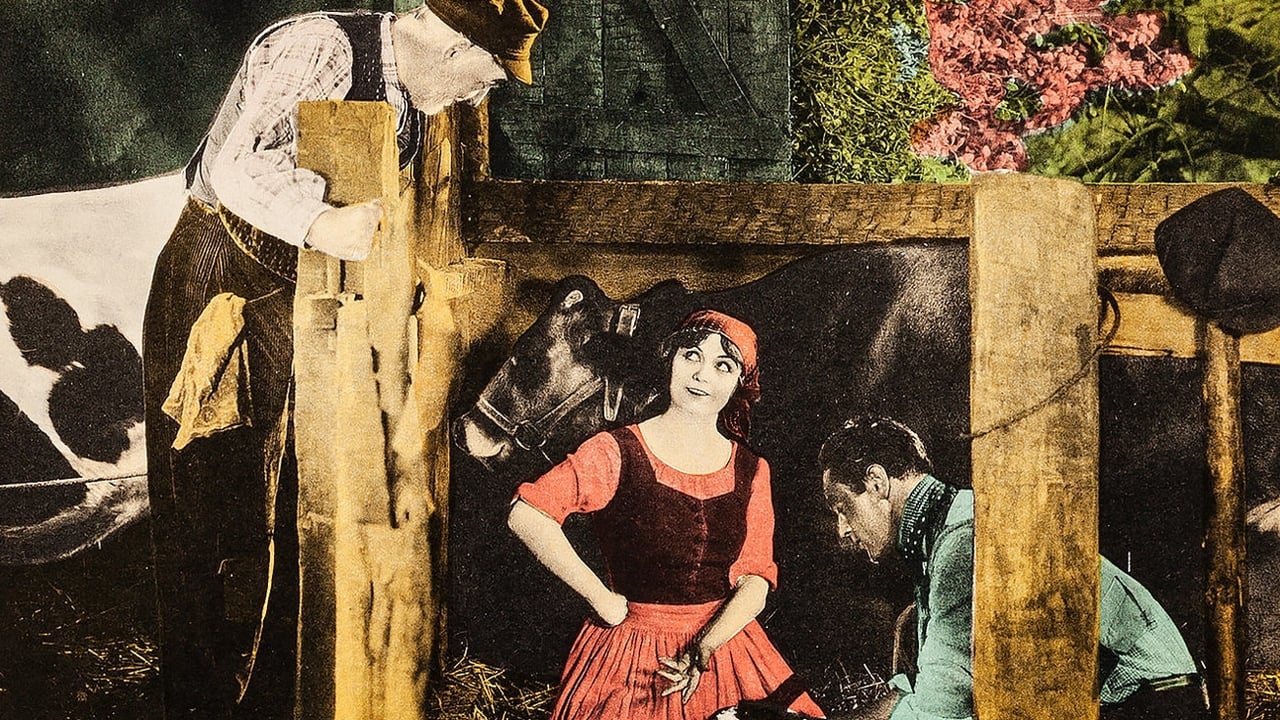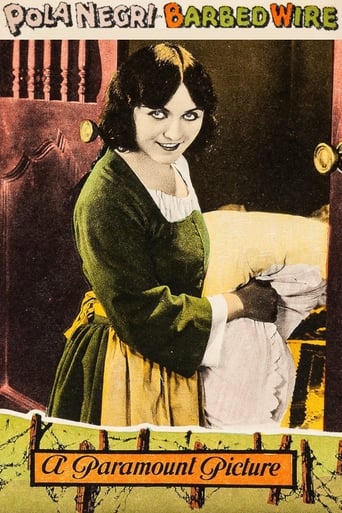

This tends to be a quiet film, unlike "The Big Parade" or "Wings." It's less about war and more focused on people's xenophobic hatred toward one another. For that reason, it deserves kudos; however, because of that it is a more difficult movie to sell to audiences and tends wears its heart on its sleeve.Negri, Brook and Cook make wonderfully believable French, German and German, respectively, characters---visually they're perfect. Negri in particular is near the height of her handsome beauty, she being of the broad-backed and strong-shouldered type personified by Nita Naldi and Louise Brooks. Negri is given some wonderful close ups where she virtually glows.Thankfully the movie is absent the stereotypical POW camp clichés such as sadistic guards and tunnel building, and it's for this reason some viewers might be less enthusiastic. I found it a relief.There's an excellent tracking shot of a distraught Negri passing cheering prisoners---simple, but memorable.The film's conclusion was much too saccharine for me, but many today will like it. WWI's horrors were still much too vivid for 1927's moviegoers and they likely needed the salve provided by the film's conclusion. I understand. A better film, "The Four Horsemen of the Apocalypse," handled its similar conclusion better seven years earlier.Negri and Adoree will always be my WWI French heartthrobs.A very good film with fine acting. Recommended.
... View MoreSet during World War 1, the film didn't treat the Allies & Axis Powers prisoners' soldiers in black hat and white hat stereotype. But as human beings. Also, the film was groundbreaking for not glorifying the war or ignoring its human costs. This is the reason, why this movie is a classic masterpiece. The central message of both the film and the novel 'The Woman of Knockaloe' by author, Hall Caine is how we must learn to forgive our former enemies, in order to live, a peaceful life. You really see that message being delivered across this film, as you find yourself, feeling for every character; no matter if they're the enemy or a friend. While, the romantic plot of former enemies falling in love with each other, isn't new; since other silent war films like 1915's 'The Captive' & 1926's 'Her Man o' War' use the same concept. Nevertheless, in my opinion, 'Barbed Wire' does the best adaptation of that premise. It was sincere, emotional and brutally real in its approach. Directed by Rowland V. Lee, the movie set the events in Normandy, France, rather than the Isle of Man, of the original novel. It's here, where a young French farm girl, Mona Moreau (Pola Negri) find out, that her farm will be used a prisoner of war camp to hold German soldiers captured. At first, she resents the presence of German soldiers being on her land, however, after talking to a kind, and hopeful, soldier, Oskar Muller (Clive Brook), she learns to like them, despite the fierce hostility of the local community around her. The actress, in this was really great. No wonder, why Negri was the first ever Continental star to be imported into Hollywood. She was amazing in this. It was so unlike Pola Negri's previous vamp-like Femme fatale roles in which, she was most famous for. I love, how she has an inner struggle with her character. Her hatred for the German & willingness to forgive. I also happy on how much, she match well, with her co-stars, such as Clive Brooks. While, Clive Brooks might be call, stiff and wooden, by some modern critics. I felt that he gave a great subtle and couther weight performance to Pola Negri's character. It is roles like this that got him, the Sherlock Holmes roles in the 1930s. Even, the supporting cast were good. I love, Clyde Cook as Hans. You really see, bits of why they call him, the 'Rubber Comedian" because of his ability to bend himself into almost any position in this film. He was funny, but his presence in the film wasn't too distracting for the main story. Despite the film having no synchronized recorded sound, especially with no spoken dialogue. The movie is very watchable for modern viewers. It's well paced. I just glad, the movie wasn't 2 or 3 hours long, as that was the style at the time. While, the movie is mostly black and white, have some extensive damage like scratches, and dirt marks. It's still visually wonderful. It has that French & German impressionist cinema style of filmmaking, full of Mise-en-scene lighting and optical devices. The love the use of film tilting in this film. The colors in those scenes really match the mood of what's going on, the screen. It's striking. One thing, that modern audience might have mix feelings of this film is how the movie change the ending of the book to happy ending, rather than tragic. For me, I'm willing to take any ending. Both, ends do work, within the means of the story. However, in my opinion, the tragic ending does work better, for this film, because you really do need to see the reasons why this mindless stubborn behavior is not good to healing old wounds. It just open new ones. It's one of the main reasons why World War II was fuel to explode, after all. Overall: I know, at the time, the English audience reacted to the film with an upsurge of anti-German sentiment, but I think as a modern viewer, this film need another deep look. It's a very rare movie that not a lot of people have heard. Its anti-war message is very ahead of its time and help influence, other later silent films like 1930's 'All Quiet on the Western Front' in helping America, rethink our opinion on our former enemies. In the end, this is a movie, I recommended watching. Check it out, you will find, the film, very fascinating.
... View MorePola Negri is every bit as good in Barbed Wire as critics had led me to believe. This is a fine film, despite the melodramatic ending that almost seemed to belong to a 1917 silent film more than one from 1927.Negri is lovely and quite restrained in her acting. Clive Brook is solid as her German love interest, if a bit stiff and definitely a little old looking for her. Actually, the one thing that kept bothering me about Brook was that he looks (to me) like a very young Forrest Tucker! (I kept expecting him to be beaten up by a very young John Wayne or to start hanging out with a very young Larry Storch!) Director Rowland V. Lee shows signs of great things to come. The story moves well and has many memorable moments. One that will stay with me is the scene were Mona is leaving the makeshift courtroom after saving Oskar's life. She is first taken by surprise by her neighbors' venom, then by the German prisoners' adoration. Her surprise at their gesture of respect (tipping their caps and following her inside the barbed wire fence) turns to faint pleasure, but just as quickly begins icing over into discomfort, then concern, then panic, as she realizes that the degree to which her enemy now admires her, her neighbors will scorn her.If the ending had been handled a bit differently, this film would be right up there among the best of the late silent classics, alongside Sunrise, The Crowd, Faust, The Wind and a handful of others. As it is, I would place it in the next tier, not one of the handful of greatest silent films ever, but certainly one of the top handful of films made in 1927. When you consider that Sunrise, Napoleon, My Best Girl, Metropolis, The General, Seventh Heaven, The Loves of Jeanne Ney, King of Kings, etc., all debuted in the Year of Lindberg (and Babe Ruth), that is quite a statement in itself.This is definitely a film for any silent cinema fan and for any other lovers of forbidden romances. The silent cinema was truly peaking in its final years.
... View MoreI saw Barbed Wire on American Movie Classics about three years ago. I liked it for it's story line of forbidden love as well of its anti-war message. The story stayed with me and still does. I was surprised at how the film could maintain my interest even though I am not of a generation of people who watched silent movies. It is intriguing that actors had to convey emotions and thoughts through actions and expressions and they did a fine job. My peers would be surprised to see the extent of the F/X available in 1927. I would like to see Jerry Bruckheimer or Kevin Costner get a hold of this story and remake for the new generation of movie enthusiasts to enjoy. Not that I don't appreciate the original, I enjoy experiencing good stories in different formats, and I would like to see this one become a classic.
... View More